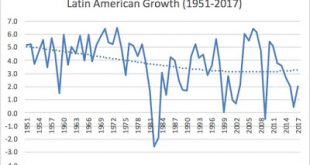I had been waiting for last month’s publication of the book “Confronting Inequality” before preparing my annual update on income inequality and redistribution in Canada. I am glad I did because the book presents new and exciting empirical findings that shed light on the age-old equity/growth debate (more on that below), but also introduced me to the Standardized World Income Inequality Database (SWIID). Data comparability and granularity has been a challenge for inequality researchers...
Read More »James Petras — US ‘Regime Changes’: The Historical Record
As the US strives to overthrow the democratic and independent Venezuelan government, the historical record regarding the short, middle and long-term consequences are mixed. We will proceed to examine the consequences and impact of US intervention in Venezuela over the past half century. We will then turn to examine the success and failure of US ‘regime changes’ throughout Latin America and the Caribbean…. US ‘Regime Changes’: The Historical Record James Petras
Read More »Matias Vernengo — Middle Income Trap or the Return of US Hegemony
Short essay in Spanish for the special (40 year anniversary of the journal Coyuntura y Desarrollo, published by the Fundación de Investigaciones para el Desarrollo, FIDE). It is essentially a critique of the concept of middle-income trap and the idea of how the demographic transitions (discussed herebefore) affect the process of development. It suggests that the deindustrialization of the Latin American periphery results as much from the decisions in the hegemonic country to open up China,...
Read More »Institutions and Economic Development in Latin America
Almost a decade ago, The Economist had a cover story about the Brazilian economy taking off. Everything seemed fine, with the Brazilian economy on the verge of surpassing Britain and France, and on its way to economic development. Among the reasons given for the Brazilian success was the fact that the country had “established some strong political institutions.” But many other factors were cited, like fiscal restraint, an independent central bank, openness to foreign direct investment,...
Read More »Duncan Green — Why is Latin America Going Backwards?
Increasingly, however, academics and development practitioners are looking at a less visible and tangible obstacle – the capture of the State by economic and political elites. The extreme concentration of economic and political power reinforces the ability to unduly co-opt, corrupt and divert the democratic process, and influence the role of the State, perpetuating measures that reinforce privilege on the one hand and inequality and exclusion on the other. This elite capture is manifested...
Read More »Financialization in Latin America
New book edited by Martín Abeles, Esteban Pérez Caldentey and Sebastían Valdecantos. From the description: The chapters in the book analyze the logic and effects of financialization in developing economies, peripheral financialization so to speak, in particular in Latin America. The first chapters look at the topic from a historical and conceptual angles, and then the latter chapters concentrate on specific manifestations like the influence of financialization on productive investment,...
Read More »US Interventions in Latin America Continue and Intensify — Greg Wilpert interviews Mark Weisbrot
Most US citizens don't realize it, but the US government has continued and even intensified its regime change agenda in Latin America and successfully helped reverse the so-called "pink tide" of left-of-center governments over the past ten years, says CEPR's Mark Weisbrot.... TRNNUS Interventions in Latin America Continue and Intensify Greg Wilpert interviews Mark Weisbrot, Co-Director of the Center for Economic and Policy Research in Washington, D.C.
Read More »Corporate Debt in Latin America and its Macroeconomic Implications
New paper by Esteban Pérez and co-authors published by the Levy Institute. From the abstract: This paper provides an empirical analysis of nonfinancial corporate debt in six large Latin American countries (Argentina, Brazil, Chile, Colombia, Mexico, and Peru), distinguishing between bond-issuing and non-bond-issuing firms, and assessing the debt’s macroeconomic implications. The paper uses a sample of 2,241 firms listed on the stock markets of their respective countries, comprising 34...
Read More »William Craddick — The Southwestern Hemisphere Is Sliding Towards Its Own “Arab Spring”
Detailed. Disobedient MediaThe Southwestern Hemisphere Is Sliding Towards Its Own “Arab Spring” William Craddick, attorney, investigative journalist, and founder of Disobedient Media
Read More »GDP growth in Latin America
Writing a paper on Latin America. Nothing particularly relevant to report. I was just checking the date. Many sources to get the data. I suggest both the World Bank Development Indicators and the Conference Board Total Economic Database. At any rate, below GDP growth from the Golden Age (after the Korean War and up to Debt crisis) to the Neoliberal Era (starting in the 1990s). Clearly growth has been more volatile and at lower rates. So much for the notion that Neoliberalism works.
Read More » Heterodox
Heterodox



